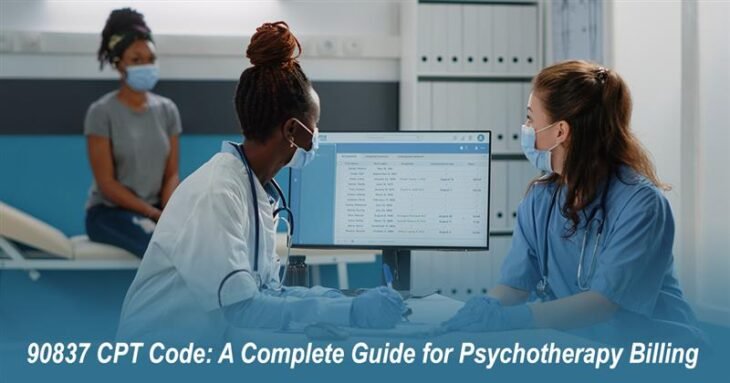
90837 CPT Code: A Complete Guide for Psychotherapy Billing
Introduction
Psychotherapy plays a very important role in behavioral health care, offering patients the support they need to manage and overcome mental health challenges. For healthcare providers, accurate documentation and billing of psychotherapy services are very important not for compliance and for maintaining healthy revenue cycles. Out of most frequently used billing codes in mental health, the 90837 CPT Code is having a particular importance.
At Pro-MedSole RCM, we work closely with healthcare providers to reduce claim denials and offer accurate reimbursement. This blog provides a detailed overview of CPT code 90837, including its description, time range, reimbursement policies, and best practices for billing.
Understanding the 90837 CPT Code
The cpt code 90837 is used for billing the psychotherapy sessions that lasts for 60 minutes. It is among the most common codes for mental health professionals. The 90837 cpt code description identifies it as a psychotherapy service which includes therapeutic communication for patients having mental health conditions. It is most commonly used by psychiatrists, psychologists, licensed professional counselors, and social workers.
Why is Procedure Code 90837 Important?
The procedure code 90837 is important because it represents longer, more detailed psychotherapy sessions. These extended appointments allow healthcare providers to resolve complex mental health needs properly. The patients who need the intensive therapy, this code offers proper billing for the time and expertise of healthcare providers.
Key Details of 90837 CPT Code
90837 CPT Code Time Range
The 90837 CPT code time range is generally considered to be 53 minutes or longer, can be extend up to 60 minutes. This means that if a session is of less than 53 minutes, there should be a use of different code, such as 90834 (45 minutes). Proper documentation of session time is very important to support billing accuracy.
90837 CPT Code Reimbursement
Insurance Coverage and Policies
The 90837 CPT code reimbursement varies by payer. While many commercial insurers and Medicaid programs reimburse for this code, some require additional documentation or justification due to the extended session length. Medicare generally accepts 90837, provided session notes clearly support medical necessity.
Documentation for Reimbursement
To ensure full reimbursement, providers must document:
- The duration of the session
- Patient symptoms and diagnosis
- Type of therapy used
- Clinical justification for extended time
If the provided documents are not adequate, it may result in denied or less payments.
Common Challenges in Reimbursement
Although the 90837 cpt code reimbursement is higher than shorter session codes, it is also scrutinized more heavily. Insurance companies sometimes flag frequent use of this code for audit, assuming providers are overbilling unless strong justification is provided.
Role of Medical Billing Companies Like Pro-MedSole RCM
Accurate Claim Submission
At Pro-MedSole RCM, we specialize in ensuring that claims for psychotherapy services, including procedure code 90837, are submitted with the right documentation. This reduces denials and keeps reimbursements on schedule.
AR and Denial Management
If a payer denies a claim for the cpt code 90837, our AR follow-up teams analyze the denial reason, correct any issues, and resubmit the claim. We also identify patterns that could prevent future denials.
Payer-Specific Knowledge
Different insurers have different policies for the 90837 CPT code time range and reimbursement. Our billing experts stay updated with payer requirements to ensure providers receive the payments they deserve.
Best Practices for Billing 90837 CPT Code
1. Document Time Precisely
Record the starting and ending time of session to clearly show that the session qualifies under the 90837 CPT code time range.
2. Provide Medical Necessity Justification
Always include clinical reasons that what’s the requirement of a longer session. For example, addressing severe depression, trauma, or complex psychiatric conditions.
3. Avoid Overuse
Insurance companies can detect suspicious activity, so avoid the frequent use of cpt code 90837. Providers should use it only when clinically mandatory, balancing with shorter codes such as 90832 or 90834 where appropriate.
4. Monitor Denials
Track denial trends for the 90837 cpt code reimbursement and adjust documentation practices accordingly.
Comparison of Psychotherapy CPT Codes
90832 vs 90834 vs 90837
- 90832: 30-minute psychotherapy session
- 90834: 45-minute psychotherapy session
- 90837: 60-minute psychotherapy session
As all three codes fall under psychotherapy billing, the procedure code 90837 covers the most extensive and detailed services.
Contact our Experts for best billing services.
FAQs
1. What’s the use of 90837 CPT code?
The 90837 CPT code is used to bill for psychotherapy sessions that lasts for 60-minutes. It represents the extended therapeutic interventions for patients with complex mental health needs.
3. What is the 90837 CPT code time range?
The 90837 CPT code time range is 53 minutes or more, typically billed for sessions lasting a full hour. Sessions under 53 minutes may fall under other codes.
5. Is 90837 covered by insurance?
Yes, most insurances cover the cpt code 90837, but documentation is very important. Some insurers require healthcare providers to explain and justify that why a longer session was necessary.
7. Why 90837 CPT code mostly audited?
Because of its higher reimbursement, insurers may suspect its overuse. Frequent or regular billing of cpt code 90837 without giving proper justification can trigger audits or denials.
8. How providers avoid denials for 90837 claims?
Providers can avoid denials by proper documenting the session time, patient symptoms, diagnosis, treatment methods, and justification for detailed therapy.
10. How Pro-MedSole RCM help with 90837 billing?
At Pro-MedSole RCM, we are providing accurate claim submission, handle denials for 90837 CPT code reimbursement, and provide ongoing support for providers in behavioral health billing.